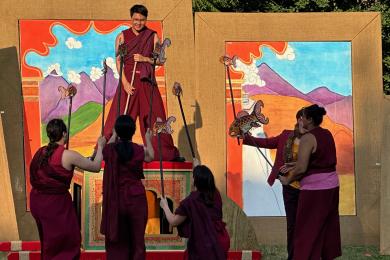Everything Old Is New Again
News
Let Me Get My Crystal Ball
It's a new year, as far as Gregorian number-crunching goes (though, not as far as theater seasons or fiscal years are concerned). Last week, I celebrated the turning of the calendar page with my thoughts about what will happen in the year to come. Not to be outdone, the Guardian newspaper in the UK has released their own predictions about 2014. Eleanor Turney's take, however, is by way of the future history of arts buzzwords.
One of the buzzwords I addressed last week was the coming rise of "creative placemaking". In further exploring this idea of leveraging arts to improve the livability of a city, I came across articles about the dark side of this practice (giving free houses to writers, notwithstanding). In New Geography this week, writer Richey Piiparinen explores how these practices can be misused or even abused for purposes that have nothing to do with art or revitalization.
This week, Graydon Royce at the Star Tribune has one-upped me by forgoing predicting and instead prescribing future events. Whether Royce is being serious or sarcastic (honestly, it's hard to tell), I wish his proposals luck. They'd certainly make things more interesting, anyway.
In With the Old
In picking through Royce's proposals (which was difficult; I'll state again that he's made it damn near impossible to tell which ones are serious and which are not), I find a curious theme. Many of the proposals he puts on the board--The Odd Couple, Chekhov, Tennessee Williams, The Women, Cabaret--are old. Maybe they're not Shakespeare, but they're well-established parts of the English-speaking canon (even though one of them is very, very Russian).
Modern theatre has a curious tension with its past. In some ways, it's downright ultraconservative in the way that it constantly harkens back to the past. Over in London, they built a complete replica of Shakespeare's Globe Theatre in order to continue the worship of the past. Now, they have added a new old space to the reverie. The Sam Wanamaker Playhouse is an incredibly faithful reproduction of a Jacobean-era indoor theatre. It's even lit by candle light, so you can really get into your role-playing. (If you were really dedicated, you'd get some pox scars before attending)
You don't have to go all the way back to Shakespeare to recycle the past, though. Musical producers have been bringing home the bacon by the dumptruck full by recycling old musicals. As much of Asia comes in line with the Western way of life, Western musical theatre has been growing in popularity (except, for some reason, Miss Saigon). Old chestnuts like Joseph and the Amazing Technicolor Dreamcoat and even notorious failures like Bonnie and Clyde are selling like hotcakes in South Korea. Of course, this may have something to do with the now-standard inclusion of K-Pop stars in big-budget shows, but it's leading to curious new trend: Korean investors putting their money in Broadway.
But something that's old can still be vital. Over in Chicago, the longest-running production in that city, Too Much Light Makes the Baby Go Blind, is celebrating its 25th anniversary. This show from the Neo-Futurists has been pumping out over 250 new short plays every year, and it shows no sign of stopping. The company has branched out of its "storefront" roots in Chicago, with an expansion team in New York that's been running for a decade, a sister company in Montreal and a new franchise in San Francisco and somehow managed to become old and influential without becoming part of the establishment.
What Do You Do Here, Again?
One of the most difficult things to do in theater is explain to someone who's not in theater what anyone besides the playwright, director and actors do. We participate in a big team sport, and many of the players never get to run around on the field.
Of course, the audience has no good reason to think about the people they never see. However, modern theater subjects and techniques have called on an increasing level of technical achievement and precision from something as arcane as stage blood. In an interview with a stage blood specialist, Howlround takes us on a brief tour on how far technicians have come from good old fashioned Karo syrup and food coloring.
One of the most difficult roles of all to explain is one for which we cannot even agree on the spelling: "dramaturge" or "dramaturg". Historian? Researcher? Nitpicker? Honestly, right now, I cannot give you a satisfactory definition that encompasses all of the different ways I have seen someone who is credited as a dramaturg work. This week, the Boston Globe delves into what exactly these people do.
Even explaining what playwrights do isn't always easy. Around the country, you will find a huge number of programs hosting playwrights "in residence"; but what does that mean, exactly? Sometimes the playwright is an active participant in education; other times he or she is sitting in a cabin in the woods alone writing; sometimes the "resident" playwright isn't even residing in the program's physical location. As it turns out, there are a huge number of definitions of what a playwriting residency really is.
What about something less well-known, like the Production Manager? According to a recent article in American Theatre Magazine, it may be the most mercurial of jobs in theatre.
Fighting for the Cause
The majority of the readers of this blog are probably theatre-makers themselves who are incredibly passionate about what they do. You may find yourselves getting angry from time to time at the powers that be for whatever decisions they make that impact you. But, let me ask you this before you go this week: have you ever been so angry that you rammed your car into the gates of the president's house? Let me introduce you to someone who has.




